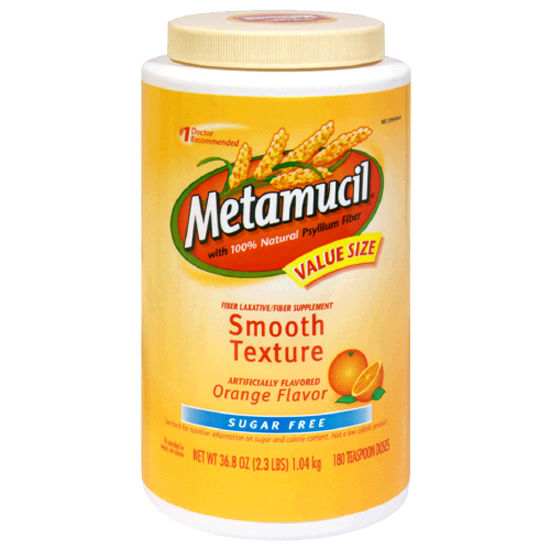
Less fluid may need to be drunk daily if you are using it for this indication.

May not be suitable for people with nausea, vomiting, abdominal pain, rectal bleeding, phenylketonuria, or difficulty swallowing.People on a low-salt diet or with uncontrolled high blood pressure may need to check with their doctor before using. Some products may contain sugar, sodium, or phenylalanine (phenylketonurics should avoid).If the daily recommended amount of fluid is not drunk, then Metamucil could cause severe constipation, especially in people who are already dehydrated.May aggravate hemorrhoids or anal fissures. Common side effects include abdominal cramps, bloating, and changes in stool consistency.If you are between the ages of 18 and 60, take no other medication or have no other medical conditions, side effects you are more likely to experience include: Many different brands of psyllium fiber are available.Available as granules, powder, wafers, and capsules.May be used for other, unapproved, indications, such as reducing blood sugar levels and HbA1c levels in people with, or at risk for, type 2 diabetes, and to help manage irritable bowel syndrome.May be used as a dietary fiber supplement.Has cholesterol-lowering properties particularly when given in addition to a diet low in cholesterol and saturated fat and may be used to reduce the risk of coronary heart disease.May help relieve occasional constipation.Psyllium may also be called Plantago seed, plantain seed, psyllium husk, or psyllium hydrophilic mucilloid. It may also be called a fiber, a bulk-forming laxative, or ispaghula.


Metamucil may be given to relieve constipation or to lower cholesterol. Metamucil is a brand (trade) name for a powdered form of psyllium husk, which is a type of soluble fiber derived from the seed husks of Plantago ovata, a type of plant.Medically reviewed by Carmen Fookes, BPharm.


 0 kommentar(er)
0 kommentar(er)
